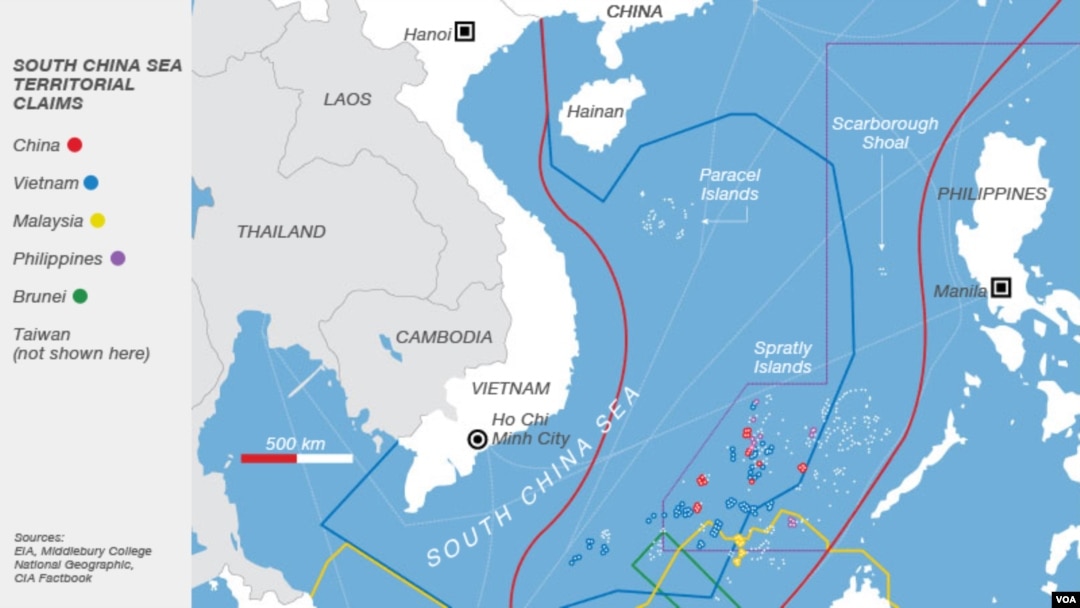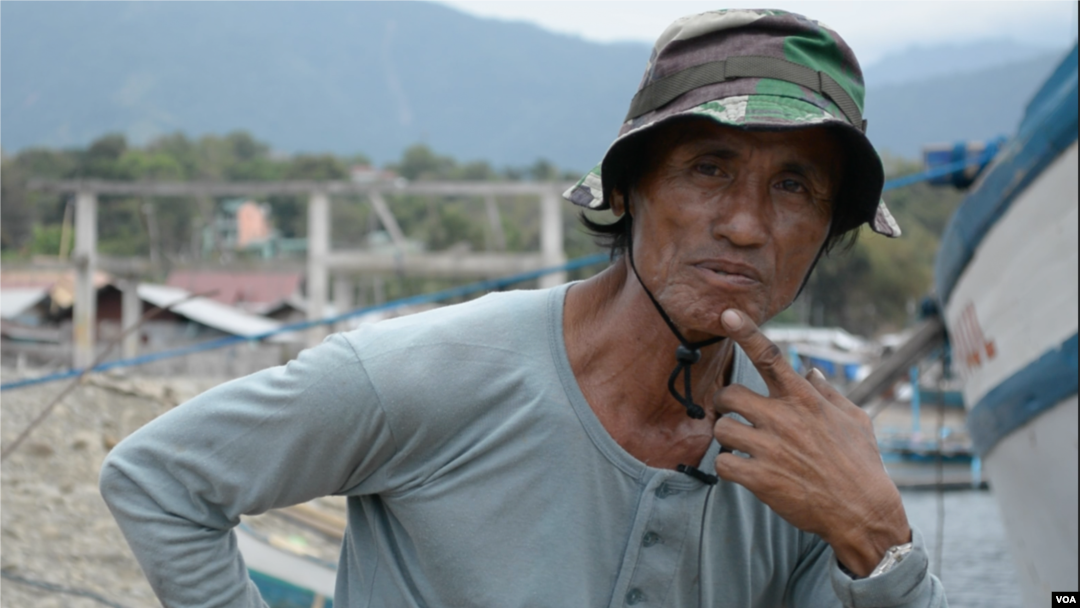MASINLOC, ZAMBALES PROVINCE, PHILIPPINES —
Almost two years ago ships from China and the Phillipines held a months-long standoff at a disputed shoal in the South China Sea. This week, some local fishermen are still staying away. The issue remains heated in the days leading up to the deadline for the Philippines to file pleadings in its international arbitration case against China over the contested waters.
Macario Sepulveda has been fishing in the South China Sea for more than 30 years. He says the vessel he captains used to go to Scarborough Shoal regularly until about two years ago.
Sepulveda says the smaller survey boats that communicate with the mother ship about the most abundant areas next to the shoal are being driven away by Chinese surveillance ships.
“Whenever we would take home our catch, the light boat would be left behind in the middle of the sea. And if the water got choppy they were able to get inside the shoal and take shelter. Now they can’t," he explains.

Masinloc town’s fishery officer Jerry Escape says 10 fishing teams used to go out to Scarborough Shoal, which is 225 kilometers west of the town. Now he says just three ships can afford to make the trip.
“The problem is their expenses when they go there is too big. Since they spent that much, they feel that they are very poor when they go back here without anything to sell,” he says, adding that a one-week fishing trip can run about $2,000. A typical catch, he says, is one ton and the fish can sell for between $2.20 and $3.30 per kilo.
According to Escape, fishing is one of three main industries in the town, and the local government is trying to remedy the dilemma by putting up fish habitats closer to shore.
The Philippine government maintains that the shoal is well within its 370-kilometer exclusive economic zone, in accordance with international law. But China, which calls it Huangyan, says it has “indisputable sovereignty over South China Sea Islands and their adjacent waters, Huangyan Island included.”
Brunei, Malaysia, Vietnam and Taiwan also have partial or total claims in the sea, which has abundant fish stocks, is a major trade route and is believed to hold vast hydrocarbon reserves. In recent years, China has stepped up policing of these waters.
In late January, fishermen from Masinloc reported to the Philippines military that a Chinese surveillance ship used a water cannon to drive them away. Manila lodged a protest with Beijing over the incident.
A month later, China’s Foreign Ministry said it had driven back some vessels from the Philippines bringing what it says were construction materials to Second Thomas Shoal, another contested formation in the sea, just west of Palawan province. The Philippines sent another protest, maintaining it was well within its rights to send provisions to its military personnel stationed at the shoal.
In January of 2013, the Philippines filed an international arbitration case over what it calls China’s “excessive” claims to practically the entire South China Sea. China, which bases its claim on ancient maps, rejects the filing and has not responded to it. The government is submitting supporting materials to the tribunal this week.
In its case, the Philippines raises the question of whether rocks and submerged features, which it says are part of its continental shelf, can be claimed by anyone else.
Scarborough Shoal is among its list of rocks.
In May 2013 the Philippines Coast Guard set up an office in Masinloc, which covers a 50-kilometer stretch from north to south of small fishing towns.
“My task is to advice the fishermen," explains Rojelio Casupang, the commander of the substation. He says for now while the issue is still too heated, they tell fishermen not to go out to Scarborough so they can avoid any confrontations.
Masinloc’s Mayor Desiree Edora says the presence of the coast guard has helped give some fishermen peace of mind, and that she hopes the dispute between the two countries will have a peaceful outcome and will result in mutual respect.
Macario Sepulveda has been fishing in the South China Sea for more than 30 years. He says the vessel he captains used to go to Scarborough Shoal regularly until about two years ago.
Sepulveda says the smaller survey boats that communicate with the mother ship about the most abundant areas next to the shoal are being driven away by Chinese surveillance ships.
“Whenever we would take home our catch, the light boat would be left behind in the middle of the sea. And if the water got choppy they were able to get inside the shoal and take shelter. Now they can’t," he explains.

Spratly Islands, China Sea Territorial Claims
According to Sepulveda, the area surrounding the shoal, locally known as Bajo de Masinloc, is fraught with choppy waves that can easily whip around smaller boats. Now, he says the vessels do not go beyond 55 kilometers outside the shoal, which has significantly reduced their catch from that area.Masinloc town’s fishery officer Jerry Escape says 10 fishing teams used to go out to Scarborough Shoal, which is 225 kilometers west of the town. Now he says just three ships can afford to make the trip.
“The problem is their expenses when they go there is too big. Since they spent that much, they feel that they are very poor when they go back here without anything to sell,” he says, adding that a one-week fishing trip can run about $2,000. A typical catch, he says, is one ton and the fish can sell for between $2.20 and $3.30 per kilo.
According to Escape, fishing is one of three main industries in the town, and the local government is trying to remedy the dilemma by putting up fish habitats closer to shore.
The Philippine government maintains that the shoal is well within its 370-kilometer exclusive economic zone, in accordance with international law. But China, which calls it Huangyan, says it has “indisputable sovereignty over South China Sea Islands and their adjacent waters, Huangyan Island included.”
Philippine Fishermen Leery of Contested Waters
Brunei, Malaysia, Vietnam and Taiwan also have partial or total claims in the sea, which has abundant fish stocks, is a major trade route and is believed to hold vast hydrocarbon reserves. In recent years, China has stepped up policing of these waters.
In late January, fishermen from Masinloc reported to the Philippines military that a Chinese surveillance ship used a water cannon to drive them away. Manila lodged a protest with Beijing over the incident.
A month later, China’s Foreign Ministry said it had driven back some vessels from the Philippines bringing what it says were construction materials to Second Thomas Shoal, another contested formation in the sea, just west of Palawan province. The Philippines sent another protest, maintaining it was well within its rights to send provisions to its military personnel stationed at the shoal.
In January of 2013, the Philippines filed an international arbitration case over what it calls China’s “excessive” claims to practically the entire South China Sea. China, which bases its claim on ancient maps, rejects the filing and has not responded to it. The government is submitting supporting materials to the tribunal this week.
In its case, the Philippines raises the question of whether rocks and submerged features, which it says are part of its continental shelf, can be claimed by anyone else.
Scarborough Shoal is among its list of rocks.
In May 2013 the Philippines Coast Guard set up an office in Masinloc, which covers a 50-kilometer stretch from north to south of small fishing towns.
“My task is to advice the fishermen," explains Rojelio Casupang, the commander of the substation. He says for now while the issue is still too heated, they tell fishermen not to go out to Scarborough so they can avoid any confrontations.
Masinloc’s Mayor Desiree Edora says the presence of the coast guard has helped give some fishermen peace of mind, and that she hopes the dispute between the two countries will have a peaceful outcome and will result in mutual respect.


